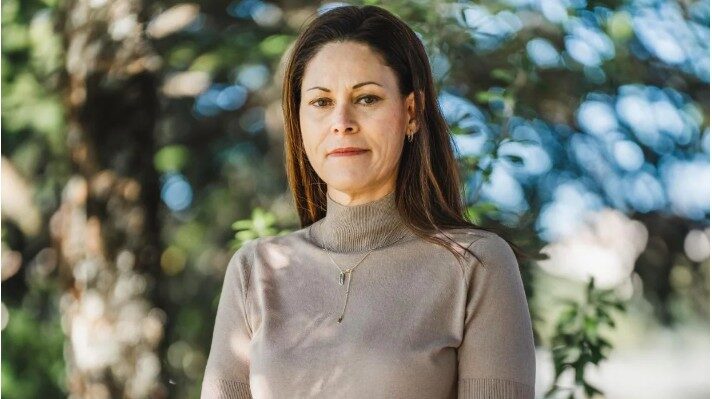
When Jackie Foster heard about Alan Hall’s wrongful conviction, she got angry. Then she got busy. On Thursday, she will be at Parliament calling for an official inquiry into one of New Zealand’s worst miscarriages of justice. Mike White reports.
Even though she lives nearby, Jackie Foster has never met Alan Hall, never had the chance to sit down with the man who spent 19 years in prison for a murder he didn’t commit.
But she knows a lot about Hall’s story: how it took 37 years to prove his innocence, how it was clear for most of that time that police had deliberately altered and hidden evidence, how authorities fought to keep an intellectually disabled man in prison at virtually every step.
This week Foster, who heads Social Justice Aotearoa, will stand in front of Parliament and hand over a petition calling for a Royal Commission of Inquiry into Hall’s wrongful conviction.
It’s the same place Alan Hall stood nearly two years ago, on the eve of a Supreme Court hearing that ruled he had suffered a “substantial miscarriage of justice”, and what happened to him was the result of “extreme incompetence or of a deliberate and wrongful strategy to secure conviction”.

Hall, then 60, had never been to Wellington before, nearly two-thirds of his life spent in prison or on restrictive parole for the 1985 murder of Auckland father of five Arthur Easton.
Hall paused on Parliament’s steps at dusk, his new white trainers almost touching the scars left by the electronic monitoring ankle bracelet he’d been forced to wear after his release from prison, which bit hard into his skin.
And in that moment, he wondered how so many people in successive governments, and elsewhere, had turned a blind eye to his case for decades.
“They let me rot in prison.”
On Thursday, Foster will once more ask those inside Parliament to do something for Alan Hall : Find out what went so terribly wrong, and hold those responsible to account.

Foster, a 52-year-old mother of two from Red Beach north of Auckland, with a background in sports, is the founder and CEO of Social Justice Aotearoa, which lobbies for change in the justice system and supports those going through it.
She knew virtually nothing of the justice system until 2019 when her son, Jamie, was charged with rape.
It was a high-profile case, given Jamie was a police officer accused of sexually assaulting a colleague after a boozy evening at a Kerikeri motel.
Despite her son being found guilty, Jackie Foster believed a significant miscarriage of justice had occurred with crucial evidence being unfairly suppressed by the court.
But more than anything, it taught her how overwhelming it is to be caught up in the justice system, a tsunami of bureaucracy and legal technicalities and cold procedure that swamped her family.

And standing outside the court while her son’s case was heard, she saw other families in tears, in exactly the same situation.
When she sought support, she found nothing.
So, after Jamie was sent to prison (he served two years of a six-year sentence before being paroled), Foster decided to do something, forming Social Justice Aotearoa to try to demystify and improve the country’s justice system.
She now lobbies on justice issues, and helps prisoners and their families find their way through a world that’s often foreign and frightening. All voluntarily.
Foster swears she’s not driven by anger at what happened to her son, or by vindictiveness towards police, or a desire to “get back at the system” in any way. She just wants to make things easier ‒ and fairer.

https://imasdk.googleapis.com/js/core/bridge3.667.0_debug_en.html#goog_1940564624Play Video
Alan Hall-A wrongful conviction finally quashed by the Supreme Court
VIDEO CREDIT: LAWRENCE SMITH/Stuff
So when she read about what had happened to Alan Hall, and how two years after the Supreme Court quashed his convictions nobody has been held responsible for what happened to him, Foster felt she had to act.
“I’m just sick of hearing wrongful convictions destroying people lives. I just want to make sure that, due to Alan’s case, things will change and people will be held to account.”
In the wake of Hall’s acquittal in June 2022 authorities launched five separate investigations.
However, the two police investigations looking at the original murder investigation, and whether anyone should be held criminally culpable for altering evidence and Hall’s subsequent wrongful conviction, are still continuing with no time-frame for their completion.
It’s left the Hall family, and the family of Arthur Easton, frustrated and questioning what is going on.
Hall has recently written to police, asking them to indicate when a decision can be expected, but hasn’t received a reply.

Foster says despite Hall’s acquittal and compensation, there are so many questions that remain unanswered. That’s why she’s calling for a Royal Commission to independently examine the case, which would remove perceptions police are unable to investigate the matter objectively, and uncover how it took so long for Hall’s wrongful conviction to be overturned.
It’s a call that’s supported by Hall and his family.
Hall’s brother Geoff says the various investigations into the case have been piecemeal, rather than holistic, and the family has been left in limbo.
“It’s taken so long, and you start to raise eyebrows at the time it’s taking the police, and I think a Royal Commission is probably the only way we’re truly going to know how Alan’s case came about ‒ and how to avoid it again.
“People have to be put on the stand and come up with these answers. All miscarriage of justice cases are ugly. Alan’s is particularly ugly because it was so blatant.
“And it could have been stopped at any time, by anyone that wanted to stop it, but they chose not to. And we need to look into this further and further.”

But Geoff Hall fears politicians won’t be brave enough to really examine this case, and the string of wrongful convictions New Zealand has suffered recently, and the fact they continue to occur.
“Who wants dirty laundry? We get told from the powers-that-be, ‘Everything is good now, we’ve got this sorted, we’re onto it.’ Bullshit.
“Whenever there’s a person pointing a finger at another person, there’s going to be a percentage of times you’re wrong. The question that needs to be asked, and answered, by government is, what is that percentage?”
Even though Alan Hall received $5 million compensation, by far the largest wrongful conviction sum in New Zealand history, Geoff Hall says they still haven’t got the answers his brother desperately wants.
“Thank god we got Alan out. Thank god he’s got some sort of a start back in life. But you don’t have that damage done to you, and spending all those years in jail, and being abused by the justice system, and then think everything’s hunky-dory.
“Here’s some money, slap on the back, apologies from some sectors, not others, and off you go.
“Not an offer of psychological counselling to rehabilitate Alan back into society. Nothing. Zero.”

Tim McKinnel, the investigator who helped expose Alan Hall’s wrongful conviction, says there’s growing momentum for a Royal Commission to take a broad look at wrongful conviction cases that have been revealed in recent years and the repeated, egregious failures behind them.
McKinnel, a former detective who has helped expose numerous miscarriages of justice, including that of Teina Pora, says wrongful convictions aren’t just rogue errors from decades ago but are undoubtedly still happening today.
“Many of the cases we now reflect upon as clear examples of innocent people being sent to prison, took 30-plus years to uncover.
“On that basis alone, I think you’d be foolhardy to think that everything has remedied itself, given there’s been no systemic analysis of what went wrong in those cases.”
Like Geoff Hall, McKinnel says there is resistance to taking an in-depth look at New Zealand’s continued miscarriages of justice, partly because people are scared of what they might discover.
“It’s the floodgates argument ‒ if we have too close a look, what will we find and then, what will we do?”
Other arguments against something like a Royal Commission were the sense things aren’t that bad; and push-back from government departments and agencies, unwilling to contemplate or admit they may have made terrible mistakes.
And while some also insist that continually reinvestigating potential wrongful convictions prevents closure for victims and others, McKinnel points to a quote from English judge Lord Atkin who noted, “Finality is a good thing, but justice is a better”.

Jackie Foster knows that when she arrives at Parliament next week, those inside may well not listen to her, just as they ignored Alan Hall.
She also knows she’s something of an amateur in the complex criminal justice world. She’s not a lawyer or an academic or judge, just someone who was thrust into a maelstrom and is determined to make things better.
“There will definitely be people out there that will go, ‘Huh? What does she know?’ But that doesn’t bother me, I am who I am.”
Before 2019 Foster’s only experience inside the system was serving on a jury 20 years earlier. She wishes she’d asked more questions in that case before helping convict the defendant.
But at that time she trusted the system, trusted its players to be upfront and honest, and put all the evidence on the table.
When her son was caught up in it, however, Foster realised how frighteningly different things were, how fallible the system was and how little control she had. How it felt like she was at the bottom of a waterfall as everything poured down on her.
How other bewildered people she met, were similarly swept along and spat out the other end, with little help.
“Until you go through it yourself, you don’t really get it. It’s been such an eye-opener.”

Despite being struck by how “horrific” Hall’s conviction was, and how morally wrong the actions of police and others were, Foster recognises many people still aren’t aware of what happened to Hall, or how bad it was.
Or worse, don’t care.
“I think we’re so desensitised to it. People just shrug their shoulders, and are so busy with their own lives. But if we can’t get to the bottom of the Alan Hall case, I believe it will just keep happening.”
Justice Minister Paul Goldsmith was approached for comment, but did not respond.

